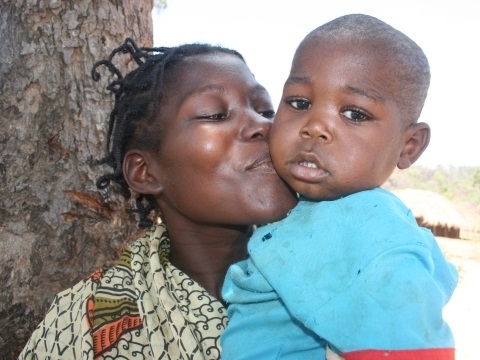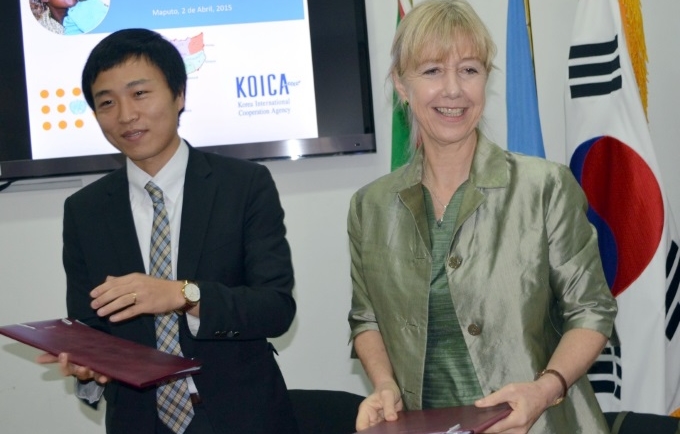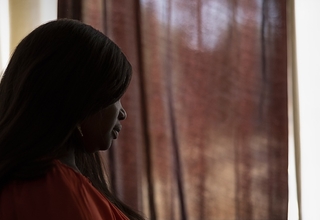CABO DELGADO, Mozambique – It’s a hot day in Chiúre district. Constangelina Basílio, 23, poses for a photograph. She holds her two-year-old son, Magalhães, tightly. The image gives the impression of a caring mother, which she is – but there is more to it than that.
“We have a special bond, because we are survivors,” says this softly spoken young woman. “I recall all the suffering as if it happened yesterday. It was around four o´clock on 25 September 2010 when I started feeling the pain. I managed to contact the community health activists to give me a ride by bicycle to Mazeze primary health clinic.”
Constangelina’s story illustrates the challenges of maternal health and childbirth in the most remote areas of the northern province of Cabo Delgado, some 2,600 kilometers away from the capital Maputo.
The ride to the clinic, along a poorly maintained road and in hot temperatures, took at least two hours. When she arrived, her expectations of receiving attention were dashed. “I was hoping to be assisted immediately. That was just a wish. The moment I arrived, the nurse told me that she would be unable to assist my birth because I required a more specialized assistance,” she recalls. “I was told that I had anemia, so I needed specific care.”

Constangelina Basílio hugs her two-year-old son, Magalhães. Photo: UNFPA Mozambique / Amancio Vilankulos |
Constangelina was transferred by ambulance to a clinic in Chiúre, an hour’s drive away. From there she was transferred to a hospital in Pemba, the provincial capital. During the three hours’ drive to Pemba, she was in constant pain and her waters broke.
“That was the longest and most stressful trip in my life,” she recounts. “I kept wondering, what if the ambulance had not been available, and what if there were no community health activists to help me? When my waters broke, I was worried. Luckily, I got to Pemba Hospital in time. I had a Caesarian section and Magalhães, my second child, was born.”
Thankfully, Costangelina and Magalhães survived. But many are not so lucky in Cabo Delgado, the province with the worst maternal health indicators in the country. The maternal mortality rate in Mozambique is 408 deaths per 100,000 live births, but in Cabo Delgado the rate stands at 822. The national neonatal mortality is 34 deaths per 1000 births, while in Cabo Delgado it stands at 51 deaths per 1000 births.
On most maternal health indicators, Cabo Delgado province compares poorly with national figures. Institutional delivery coverage in the province is 36 per cent, against a national average of 55 per cent. The provincial adolescent pregnancy rate is 54 per cent, against a national average of 38 per cent. The provincial contraceptive prevalence rate is 3 per cent against a national average of 12 per cent. The province has the lowest literacy rate among women and the highest early pregnancy rate in the country. It also has high expectations for economic growth, given its natural resource reserves.
“It was based on this scenario that we decided to work on a specific response and started drafting a proposal for South Korea’s Air-Ticket Solidarity Levy Fund,” says Bettina Maas, UNFPA Representative in Mozambique. The process culminated last week in the signing of an agreement between UNFPA and KOICA, the Korean International Cooperation Agency.
The South Korean Government will grant $7.25 million through UNFPA to support a four-year maternal and neonatal health programme in Cabo Delgado.
“Korea in the 1960s was an undeveloped country and we experienced similar problems,” said Heeseok Ko, KOICA representative in Mozambique. “We decided to support this programme in order to help Mozambique improve its maternal health situation.”
Dr. Francisco Mbofana, the Ministry of Health’s National Director of Public Health, said this resource would help reduce resource gaps in the health sector. “And hopefully, Cabo Delgado will improve its maternal and neonatal indicators.”
The programme would ensure the provision of high-quality, essential maternal and neonatal services, and to ensure that vulnerable groups have access to and the use of quality sexual and reproductive health and newborn services. Targeting women of reproductive age and adolescents, it will be implemented by the Ministry of Health and NGOs. It is estimated that it will reach over 70 per cent of the 1.8 million population of Cabo Delgado. The World Health Organization will provide technical assistance during the programme implementation.
Ms. Maas said the programme would strengthen the capacity of community health workers to promote and provide family planning.
And that is something Costangelina appreciates: “Based on my experience, I have joined the group of community health activists, and I go around and tell women of my age that it’s very important to seek assistance to deliver at the hospital to avoid complications. I also inform them to go to the clinic to receive information that will help them to delay and space pregnancy, and to access different contraception methods for free to better plan their families.”
UNFPA Regional Director Dr. Julitta Onabanjo welcomed the signing of the agreement. “This is timely support from South Korea, as countries in the region accelerate efforts to reduce preventable maternal deaths and disabilities,” she said.
By Amancio Miguel



